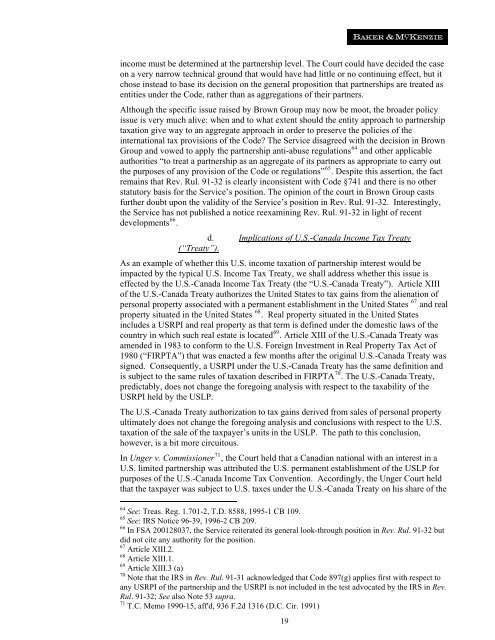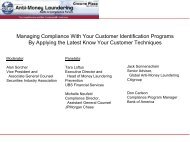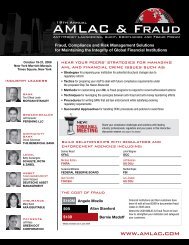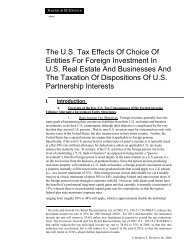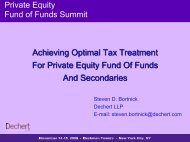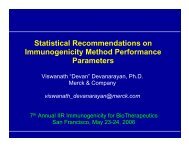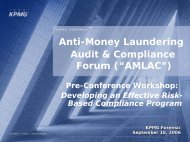The US Tax Effects Of Choice Of Entities For Foreign Investment - IIR
The US Tax Effects Of Choice Of Entities For Foreign Investment - IIR
The US Tax Effects Of Choice Of Entities For Foreign Investment - IIR
You also want an ePaper? Increase the reach of your titles
YUMPU automatically turns print PDFs into web optimized ePapers that Google loves.
income must be determined at the partnership level. <strong>The</strong> Court could have decided the case<br />
on a very narrow technical ground that would have had little or no continuing effect, but it<br />
chose instead to base its decision on the general proposition that partnerships are treated as<br />
entities under the Code, rather than as aggregations of their partners.<br />
Although the specific issue raised by Brown Group may now be moot, the broader policy<br />
issue is very much alive: when and to what extent should the entity approach to partnership<br />
taxation give way to an aggregate approach in order to preserve the policies of the<br />
international tax provisions of the Code? <strong>The</strong> Service disagreed with the decision in Brown<br />
Group and vowed to apply the partnership anti-abuse regulations 64 and other applicable<br />
authorities “to treat a partnership as an aggregate of its partners as appropriate to carry out<br />
the purposes of any provision of the Code or regulations” 65 . Despite this assertion, the fact<br />
remains that Rev. Rul. 91-32 is clearly inconsistent with Code §741 and there is no other<br />
statutory basis for the Service’s position. <strong>The</strong> opinion of the court in Brown Group casts<br />
further doubt upon the validity of the Service’s position in Rev. Rul. 91-32. Interestingly,<br />
the Service has not published a notice reexamining Rev. Rul. 91-32 in light of recent<br />
developments 66 .<br />
d. Implications of U.S.-Canada Income <strong>Tax</strong> Treaty<br />
(“Treaty”).<br />
As an example of whether this U.S. income taxation of partnership interest would be<br />
impacted by the typical U.S. Income <strong>Tax</strong> Treaty, we shall address whether this issue is<br />
effected by the U.S.-Canada Income <strong>Tax</strong> Treaty (the “U.S.-Canada Treaty”). Article XIII<br />
of the U.S.-Canada Treaty authorizes the United States to tax gains from the alienation of<br />
personal property associated with a permanent establishment in the United States 67 and real<br />
property situated in the United States 68 . Real property situated in the United States<br />
includes a <strong>US</strong>RPI and real property as that term is defined under the domestic laws of the<br />
country in which such real estate is located 69 . Article XIII of the U.S.-Canada Treaty was<br />
amended in 1983 to conform to the U.S. <strong>For</strong>eign <strong>Investment</strong> in Real Property <strong>Tax</strong> Act of<br />
1980 (“FIRPTA”) that was enacted a few months after the original U.S.-Canada Treaty was<br />
signed. Consequently, a <strong>US</strong>RPI under the U.S.-Canada Treaty has the same definition and<br />
is subject to the same rules of taxation described in FIRPTA 70 . <strong>The</strong> U.S.-Canada Treaty,<br />
predictably, does not change the foregoing analysis with respect to the taxability of the<br />
<strong>US</strong>RPI held by the <strong>US</strong>LP.<br />
<strong>The</strong> U.S.-Canada Treaty authorization to tax gains derived from sales of personal property<br />
ultimately does not change the foregoing analysis and conclusions with respect to the U.S.<br />
taxation of the sale of the taxpayer’s units in the <strong>US</strong>LP. <strong>The</strong> path to this conclusion,<br />
however, is a bit more circuitous.<br />
In Unger v. Commissioner 71 , the Court held that a Canadian national with an interest in a<br />
U.S. limited partnership was attributed the U.S. permanent establishment of the <strong>US</strong>LP for<br />
purposes of the U.S.-Canada Income <strong>Tax</strong> Convention. Accordingly, the Unger Court held<br />
that the taxpayer was subject to U.S. taxes under the U.S.-Canada Treaty on his share of the<br />
64 See: Treas. Reg. 1.701-2, T.D. 8588, 1995-1 CB 109.<br />
65 See: IRS Notice 96-39, 1996-2 CB 209.<br />
66 In FSA 200128037, the Service reiterated its general look-through position in Rev. Rul. 91-32 but<br />
did not cite any authority for the position.<br />
67 Article XIII.2.<br />
68 Article XIII.1.<br />
69 Article XIII.3 (a)<br />
70 Note that the IRS in Rev. Rul. 91-31 acknowledged that Code 897(g) applies first with respect to<br />
any <strong>US</strong>RPI of the partnership and the <strong>US</strong>RPI is not included in the test advocated by the IRS in Rev.<br />
Rul. 91-32; See also Note 53 supra.<br />
71 T.C. Memo 1990-15, aff'd, 936 F.2d 1316 (D.C. Cir. 1991)<br />
19


